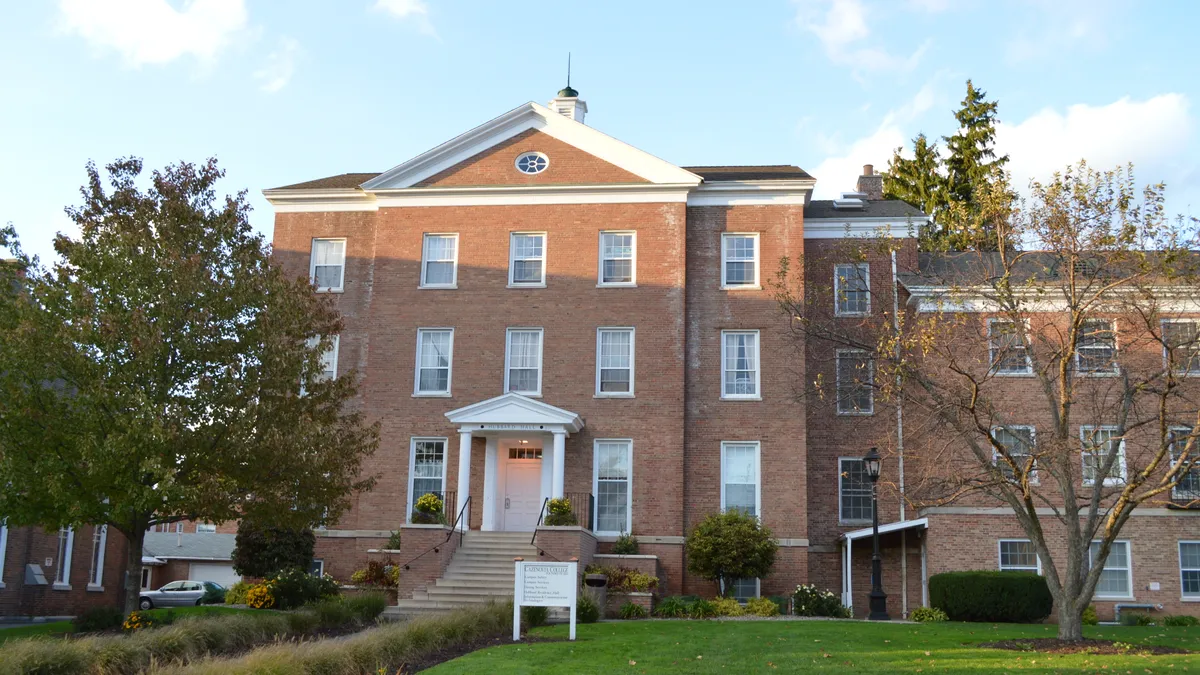Dive Brief:
- Cazenovia College, a small nonprofit institution in upstate New York, defaulted on a $25 million bond payment last month, throwing into question its financial sustainability.
- The money was due Sept. 1, but a recent independent audit of the college noted that it lacked “sufficient liquid resources” to pay it. The college was unable to obtain new financing even after the payment date was extended by a month.
- The private college now has until Nov. 3 to come to an agreement with bondholders. The institution initially borrowed the $25 million to refinance existing debt and improve campus facilities in an effort to counteract faltering enrollment.
Dive Insight:
Cazenovia College is suffering from many of the problems plaguing higher education, especially small nonselective colleges. These institutions are fighting over a shrinking share of students in many regions of the U.S. at a time when high school graduates are questioning whether college is worth the cost.
And nonselective institutions are expected to see credit pressures worsen, according to a recent report from Fitch Ratings.
Fitch predicted that small, less-selective colleges are unlikely to see a rebound in undergraduate enrollment, which has declined 9.4% across all institution types since the pandemic began. These trends are expected to further harm small institutions’ budgets given that they rely more on tuition and fee revenue than other colleges do.
Regional differences also matter. While the South, West and Southwest all gained population during the pandemic, the Northeast and Midwest saw declines. Regions losing population also experienced larger enrollment decreases compared to colleges in other locations.
At Cazenovia, enrollment has fallen from a high of 963 full-time students in fall 2014 to just 571 full-time students in fall 2022, a nearly 41% decline.
“Where we have seen the most credit pressure in the sector in recent years has been in institutions that look similar to this,” said Emily Wadhwani, a senior director at Fitch Ratings. “This is, unfortunately, an institution that has had continuous enrollment pressures that really preexisted the pandemic.”
New York’s Excelsior Scholarship, which allows students from families earning up to $125,000 annually to attend state colleges tuition-free, is a possible contributor to those declines, Wadhwani said.
That’s because it may have incentivized low-income students to move away from more expensive institutions in favor of public colleges in the state.
Cazenovia’s tuition, fees, room and board, and other expenses were listed totaling around $54,000 for on-campus students in fall 2021, though few families pay full prices. The average net price for first-time, full-time students hovered around $18,000 that year, according to federal data.
The institution’s enrollment losses have seriously harmed its bottom line, and they contributed to doubts earlier this year that it would be able to make its bond payment and continue operating.
In fiscal 2021, Cazenovia posted a $2 million loss, better than the $3.3 million loss it incurred the year before. The college has been pursuing initiatives to increase revenue — such as soliciting private donations, adding graduate offerings and streamlining transfer pathways — but those moves haven’t yet improved its financial picture.
Bond defaults are rare for nonprofit colleges, Wadhwani said. However, mergers and closures have picked up the pace in recent years — a trend that Fitch expects to continue.
Some colleges that have defaulted on their bond payments have closed in recent years, including Ohio Valley University, which shut down last year.
But Wadhwani said that a default doesn’t necessarily mean a college is fated to close. Cazenovia may work out an agreement with bondholders, including one that gives the college longer to make the payment, or it could be an appealing acquisition for another college.
“A default in and of itself is not necessarily a predictor of closure, but it certainly indicates that we are at a point of limited financial capacity for continuation,” Wadhwani said. “Without a forbearance agreement, without a resolution with bondholders — that certainly can push the decision to close over the edge.”
Timothy Greene, a spokesperson for Cazenovia, declined to comment, citing ongoing discussions with bondholders. A representative for UMB Bank, bondholders’ trustee, did not answer emailed questions Monday, instead referring Higher Ed Dive to municipal bond filings.
Greene previously told Syracuse.com that "these are challenging times for small private colleges due to declining demographics in the region and the impacts of COVID."











